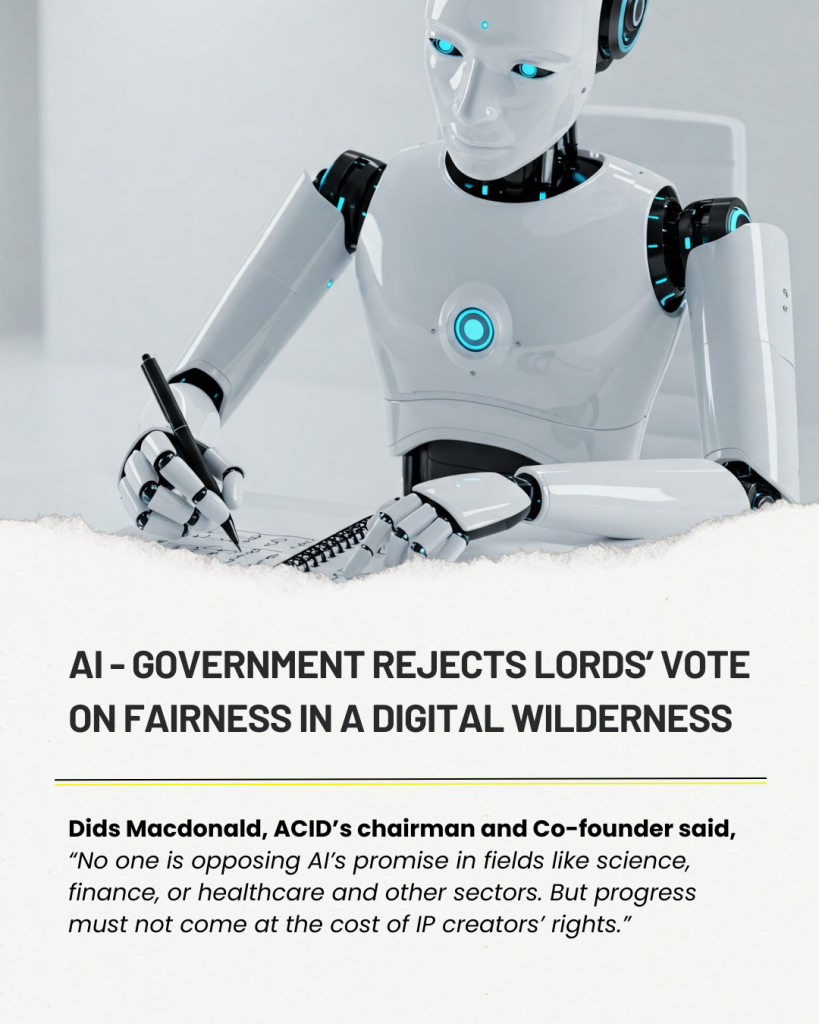

Despite the Lords passing Baroness Kidron’s amendment to the Data (Use and Access) Bill by 242 votes to 112 on Monday, Ministers have rejected transparency measures and so it will go back to the Lords for the fourth time in an extraordinary legislative ping pong standoff. The current amendment, focused on AI transparency and copyright protection, and champions fairness for musicians, writers, filmmakers, not forgetting the UK’s 1.97 million designers, who contribute over £97,4 billion annually to the economy.
As data scraping accelerates at a pace outstripping even his own remarks, the assurances of Minister for Data and Telecoms, Sir Chris Bryant, that “we are not undermining copyright owners’ control over their work” and that “we have said from the beginning that we want intellectual property owners to have more control over the use of their works”, were met with scepticism.
Dame Caroline Dineage said, “If only I believed the Minister. I pick up the frustration in his tone, and I appreciate that this must be exhausting for him, because this is the fourth time that the Government have been defeated on this issue in the other place. I understand that he just wants to get this piece of legislation done, but this time it only requires the Government to come forward with a plan to implement transparency before it is too late. He says that our copyright law is robust and that he is not seeking to undermine it—it is robust, but it is being ignored. How long will it take before the Government hold the AI companies to account for what is effectively the biggest copyright heist in history? How long will it take before the Government clamp down on what is basically the whitewashing of the behaviour of big tech? Who is really pulling the strings here?“
Dr Ben Spencer said, “We will be stuck in groundhog day on this Bill until the Government realise that the Lords amendments are not a nuisance, but an opportunity, and that they need to listen to the concerns and change course. The noble Lords in the House in which this Bill started have made clear the risk to creatives from AI companies taking their data, and the importance of fairness and transparency. We on the Opposition Benches and Members on both sides of the House have raised similar concerns, but we do not have the numbers yet. In Parliament, it is not sufficient to win the vote; it is also necessary to win the argument, and the Government have lost this argument”.
For the full Hansard report on yesterday’s House of Commonsdebate see here
At the heart of the issue is the growing use of copyrighted creative work in AI training without consent, credit, or compensation. This unchecked practice, driven by powerful tech companies, has triggered widespread concern across the creative sector. Many creators, often operating as individuals or small businesses, lack the resources to challenge such exploitation and urgently need statutory protection.
Kidron’s amendment aimed to introduce transparency into AI training practices and strengthen existing copyright enforcement. It avoids overreach by shifting to a draft Bill framework, respecting the Commons’ financial primacy while allowing Parliament to legislate for greater transparency—a practical and balanced approach. The government, if willing, could still propose its own version of the amendment, offering a more effective path forward.
The stakes are high. Without swift action, existing copyright protections risk becoming obsolete amid AI’s rapid advancement. This threatens not only individual livelihoods but the integrity and future of the UK’s world-renowned creative industries and other content creators. While government officials have made supportive statements, words alone are insufficient. A clear legislative commitment is needed to ensure that AI development proceeds with equity, accountability, and respect for human creativity.
Dids Macdonald, ACID’s Chairman and Co-founder said, “A government which purports to support creators is simply not listening. No one is opposing AI’s promise in fields like science, finance, or healthcare and other sectors. But progress must not come at the cost of IP creators’ rights. Algorithms cannot replicate the originality and soul embedded in human-inspired work. The unchecked use of creative content in AI systems raises profound ethical and economic questions”.
Kidron’s proposal is not just a set of words. From a world-renowned filmmaker and creator, this is a declaration that technological progress must align with human values. It signals to government and industry that creators are up in arms about their content being given away without their permission. In an era where AI is shaping the future, this amendment is a call to futureproof a society where innovation supports, rather than exploits, those who create it.
Spread the Word
| Cookie | Duration | Description |
|---|---|---|
| cookielawinfo-checkbox-analytics | 11 months | This cookie is set by GDPR Cookie Consent plugin. The cookie is used to store the user consent for the cookies in the category "Analytics". |
| cookielawinfo-checkbox-functional | 11 months | The cookie is set by GDPR cookie consent to record the user consent for the cookies in the category "Functional". |
| cookielawinfo-checkbox-necessary | 11 months | This cookie is set by GDPR Cookie Consent plugin. The cookies is used to store the user consent for the cookies in the category "Necessary". |
| cookielawinfo-checkbox-others | 11 months | This cookie is set by GDPR Cookie Consent plugin. The cookie is used to store the user consent for the cookies in the category "Other. |
| cookielawinfo-checkbox-performance | 11 months | This cookie is set by GDPR Cookie Consent plugin. The cookie is used to store the user consent for the cookies in the category "Performance". |
| viewed_cookie_policy | 11 months | The cookie is set by the GDPR Cookie Consent plugin and is used to store whether or not user has consented to the use of cookies. It does not store any personal data. |